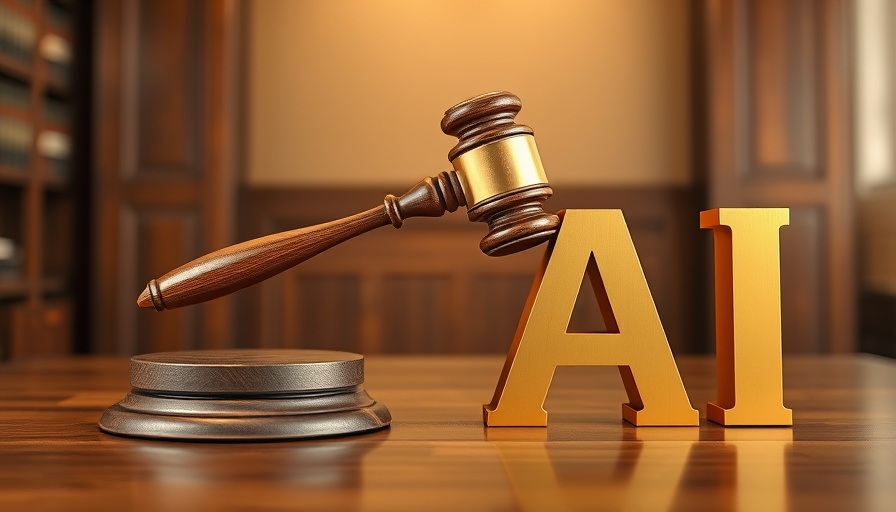
UK Court's Stark Warning on AI in Legal Work
A recent ruling from the High Court of England and Wales has thrown a spotlight on the responsibilities of lawyers in the age of artificial intelligence. This warning is particularly timely as the use of AI-generated content becomes increasingly widespread in various professions, including law. Judge Victoria Sharp's ruling emphasizes that, while generative AI tools like ChatGPT can provide quickly assembled responses, they lack the reliability required for legal research.
The Dangers of Relying on AI-Generated Content
Judge Sharp noted, “Such tools can produce apparently coherent and plausible responses to prompts, but those coherent and plausible responses may turn out to be entirely incorrect.” This discrepancy can lead legal professionals into dangerous territory, as inadequate verification of AI-generated information could result in citing false cases or misrepresenting legal facts. In her ruling, she highlighted specific instances where lawyers cited non-existent cases in court filings, endangering their reputations and professional standing.
The Legal Professionals' Duty to Verify
As per Judge Sharp’s directive, even in this digital age, the fundamental duties of lawyers remain unchanged. They are still obliged to ensure that the evidence presented in court is accurate and credible. “Lawyers need to take stronger steps to prevent the misuse of artificial intelligence in their work,” she asserted, pushing for greater accountability within the legal profession.
What Consequences Could Lawyers Face?
The court's ruling starkly warned that failure to comply with these responsibilities could lead to severe sanctions. Lawyers found guilty of negligence related to the use of AI-generated content could face repercussions ranging from public censure to more severe disciplinary actions by professional regulators. This is not just a minor issue but a potentially career-ending situation for those who fail to adhere to established legal standards.
Identifying the Professional Dilemma
Two key cases served as the backdrop for this ruling. In one instance, a lawyer representing a client in a dispute with two banks submitted legal documents filled with incorrect case citations. Shockingly, 18 out of 45 cited cases did not even exist. In another case, a lawyer invoked five fictitious cases in a filing related to a wrongful eviction. Despite denying the use of AI in the submissions, the lawyer admitted the cases might have come from AI-generated summaries accessed online. This admission raises questions about the diligence exercised by legal professionals in clarifying their research sources.
The Need for Ethical Guidelines in AI Usage
As the legal landscape adapts to integrating AI technology, there is a pressing need for clear ethical guidelines on using such tools. The Bar Council and the Law Society will review Judge Sharp’s ruling to reinforce existing frameworks and set new standards for AI ethics in legal practice. This is an evolving conversation but highlights the essential balance between leveraging technological advancements and upholding the integrity of the legal profession.
A Look Ahead: Training for Legal Professionals
As concerns about AI’s reliability become more prevalent, legal institutions need to provide training on verifying sources and understanding the limitations of generative AI tools. Lawyers will need guidance on how to navigate the complexities of using AI responsibly—this includes distinguishing between reliable, authoritative sources and AI-generated content. By embracing these educational opportunities, legal professionals can mitigate the risks associated with AI use in legal research.
Engaging with Current Legal Trends
The rise of AI in legal practices is a crucial topic that calls for continuous discourse. The legal community must remain vigilant in addressing the complexities of new technologies. As AI capabilities evolve, so must legal responsibilities and ethical guidelines, ensuring that the legal profession continues to uphold justice and accuracy in its proceedings.
In conclusion, this ruling from the High Court serves as a crucial reminder of the professional obligations that lawyers carry. As AI technology becomes more integrated into legal frameworks, it is imperative for legal professionals to maintain their own standards of research and integrity—balancing the flexibility of AI with the rigorous demands of their profession. The future of legal practice alongside AI holds immense potential but requires a commitment to accuracy and ethics.
 Add Row
Add Row  Add
Add 




 Add Row
Add Row  Add
Add 

Write A Comment